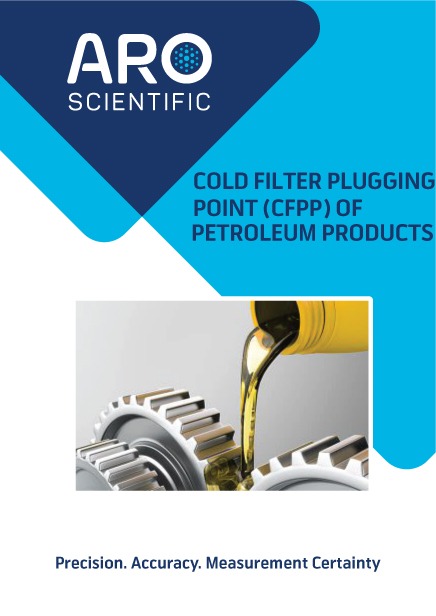Guide to understanding Cold Filter Plugging Point (CFPP)

What is the Cold Filter Plugging Point (CFPP)?
Cold Filter Plugging Point (CFPP) is a critical parameter that determines the lowest temperature at which a given volume of diesel fuel, biodiesel blends, gas oils and other middle distillates can pass through a standardised filtration device. Understanding Cold Filter Plugging Point is crucial for preventing fuel filter plugging and engine problems in cold weather conditions. This guide will provide a brief overview of Cold Filter Plugging Point, including its significance, test methods, and practical implications for industry professionals.
What is the difference between Cloud Point and Cold Filter Plugging Point?
Cloud Point and Cold Filter Plugging Point (CFPP) are both temperature-related parameters for diesel fuel, biodiesel blends, gas oils and other middle distillates, but they serve different purposes. The Cloud Point refers to the temperature at which solid components begin to form a cloudy appearance in the fuel, indicating the onset of wax crystals. In contrast, Cold Filter Plugging Point is the temperature at which the fuel can no longer flow through a filter, leading to potential engine issues. Understanding the distinction between these two parameters is crucial for effectively managing middle distillate fuel performance in cold weather conditions.
Importance of understanding Cold Filter Plugging Point (CFPP)
Understanding the Cold Filter Plugging Point (CFPP) for diesel fuel, biodiesel blends, gas oils and other middle distillates is vital for ensuring optimal engine performance in colder temperatures. Cold Filter Plugging Point indicates the lowest temperature at which middle distillate fuels can efficiently flow through a fuel filter and other passages in the fuel system. Knowing this critical threshold allows operators to anticipate and prevent potential issues such as filter clogging and engine malfunctions due to wax crystal formation. By monitoring and managing Cold Filter Plugging Point levels, one can make informed decisions regarding fuel blending, additives, or storage conditions to maintain fuel quality and prevent disruptions during cold weather conditions.
Factors affecting Cold Filter Plugging Point (CFPP)?
Some of the factors affecting the Cold Filter Plugging Point (CFPP) include the type and amount of hydrocarbons in the fuel, which impact its ability to flow in cold temperatures. Higher levels of paraffin wax may lead to earlier filter plugging. Additionally, exposure to low temperatures during storage or operation can cause wax crystals to form, affecting the Cold Filter Plugging Point. Understanding these factors is crucial for middle distillate fuel users to mitigate the risk of filter clogging and engine issues in cold weather conditions.
International testing methods for Cold Filter Plugging Point (CFPP)
Testing methods for Cold Filter Plugging Point (CFPP) are essential for users to ascertain a middle distillate fuels performance in cold weather. There are Various recognised international standards, some commonly used methods include, but are not limited to:
IP 309 - Diesel and domestic heating fuels - Determination of cold filter plugging point
ASTM D6371 - Standard Test Method for Cold Filter Plugging Point of Diesel and Heating Fuels
EN 116 - Diesel and domestic heating fuels - Determination of cold filter plugging point
By performing Cold Filter Plugging Point (CFPP) tests regularly, users can monitor things such as the effectiveness of additives and storage conditions in preventing filter plugging. Understanding and adopting appropriate testing methods is crucial for ensuring fuel quality and operational reliability.
When selecting a test method, it's essential to consider factors such as the type of petroleum product, the expected Cold Filter Plugging Point (CFPP) value, and the laboratory's equipment capabilities. Additionally, adherence to specific standards, whether ASTM, IP, or ISO/EN, is often necessary for regulatory compliance and consistency in testing.
By employing one or more of these test methods, industry professionals can accurately determine the Cold Filter Plugging Point (CFPP) of diesel fuel, biodiesel blends, gas oils and other middle distillates enabling them to select the most suitable products for specific environmental conditions.
How to prevent Cold Filter Plugging Point (CFPP) issues
To mitigate Cold Filter Plugging Point (CFPP) related problems, proper storage practices, such as protecting fuel from moisture and ensuring tanks are full to reduce condensation, can also help prevent filter plugging. Regularly monitoring Cold Filter Plugging Point (CFPP) levels through testing will allow early detection of potential issues and prompt corrective actions.
What is a Cold Filter Plugging Point (CFPP) reference standard or Cold Filter Plugging Point (CFPP) certified reference material
A Cold Filter Plugging Point (CFPP) reference standard or certified reference material (CRM) is a substance with a known and stable Cold Filter Plugging Point (CFPP) value that is used for calibration and validation purposes during Cold Filter Plugging Point (CFPP) testing of diesel fuel, biodiesel blends, and gas oils and other middle distillates.
It serves as a benchmark against which the performance of the testing equipment and the consistency of testing procedures can also be assessed.
Cold Filter Plugging Point reference materials are crucial in quality control and assurance processes for laboratories and industries dealing with petroleum products. By using a known reference material with a certified Cold Filter Plugging Point value, laboratories can assess the performance of their testing apparatus and ensure that the measurements obtained during the testing process are accurate and reliable.
Using Cold Filter Plugging Point reference standards and certified reference materials that are accredited to ISO 17034 ensures a high level of confidence in the accuracy, consistency and traceability of your Cold Filter Plugging Point measurements and helps confirm compliance with industry regulations.
ISO 17034 accreditation of the reference material producer benefits users of Cold Filter Plugging Point reference standards and certified reference materials as it provides confidence in the competence of the producer to manufacture and characterise such materials.
ARO Scientific offer accredited Cold Filter Plugging Point (CFPP) reference standards and certified reference materials. Manufacture and characterisation have been performed in accordance with its accreditation to ISO 17034, UKAS CAB No. 27393.




